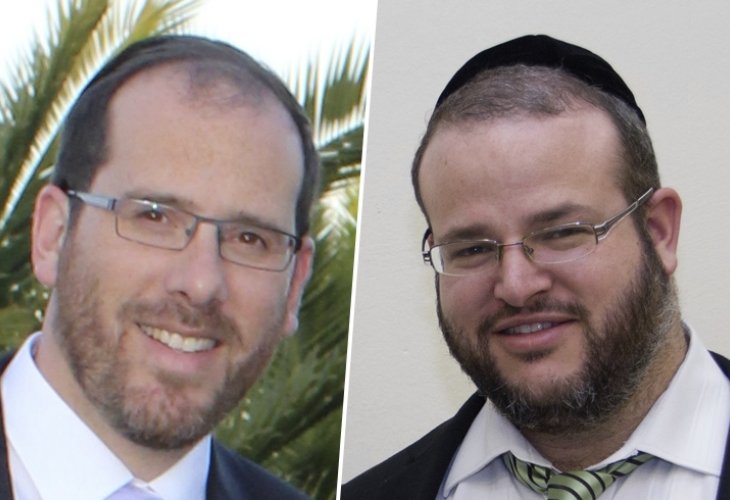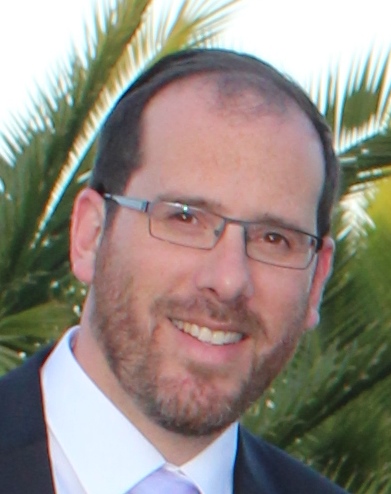Therapists Warn: "An Unqualified Therapist Can Cause Lifelong Damage"
Awareness of psychological treatments, the high cost of a good psychologist, quackery in the field, and the lack of oversight on treatments. Professionals social worker Nati Becker and Michael Nechtiler talk about it all.
 Nechtiler and Becker
Nechtiler and BeckerIt was a few weeks ago. Michael Nechtiler, chairman of the 'Haredi Therapists Union,' received a call from a man who sounded frightened, even terrified. "I can't believe this is happening to me," he told Nechtiler. "I have a son studying at an excellent yeshiva and he's considered a very good boy. But recently, we've started looking into matches for him, and all the proposals were withdrawn without explanation. One day, I decided to call the yeshiva and conduct a little experiment. I asked to speak with one of the boys and tried to inquire about my son as if I was interested in him for a match for my daughter. To my shock, there was no limit when I mentioned the boy's name, and I heard the response: 'I have to tell you that this boy takes medications...' I didn't give up and tried again, but again heard the same: 'The boy is on medication.' I was horrified. I had no idea where this information came from. Of course, I spoke with my son that very day and it turned out that the problem was actually with me. When he started studying in the great yeshiva, he went through difficulties that I now know are typical of his age. Worried about him, I took him to an 'educational therapist' to help him, and he indeed accompanied him. What I hadn't considered was that at some point, he overstepped his authority and recommended my son take medications, without consulting me or anyone else."
"This story does have a happy ending," Nechtiler notes, "because the boy truly had no problem. I referred him to a professional therapist who, of course, dismissed the need for medication and treated him correctly and properly. After three months, he no longer needed therapy and very quickly got married as well. But unfortunately," he adds, "not all stories end so optimistically. Because sometimes the fact that people turn to unprofessional therapists has a very high cost, even very high."
 (Photo: shutterstock)
(Photo: shutterstock)
Awareness Without Understanding
Michael Nechtiler leads the 'Haredi Therapists Union' with his partner, co-founder of the union, social worker Nati Becker. Both try in every way to raise awareness of the importance of choosing appropriate professionals who can truly help people and not, heaven forbid, do the opposite. "It's important so that people don't suffer," they clarify, "so they receive the right treatment."
 Michael Nechtiler
Michael Nechtiler You both know the world of therapy in the religious community closely. Do you see a difference between what happens today in the field and what happened in the past?
"No doubt that in recent years, awareness of psychological treatment has significantly increased," says Nati Becker. "People have become more aware of the subject. They no longer feel that turning to a psychologist indicates they have a problem or that no one will want to marry them. Rather, they understand that just as a sick person needs treatment by a doctor, so too when there is a psychological difficulty, there is a need for psychological treatment."
"The perception of the welfare system has also entirely changed," Nechtiler adds. "To illustrate this, I'll give an extreme example. If in the past social workers were considered 'child snatchers,' today, I don't think there's anyone in the Haredi community who doesn't know at least in their third circle a social worker and understands that they have no malicious intentions, not about kidnappings or anything else. This means that the perception of the welfare system has changed. The community understands that there are truly good professionals, many of whom work from within the Haredi community and professionally. People are learning to trust them."
"But the real progress, in my opinion, is that they don't turn 'blindly' to any therapist advertising in some leaflet, but first check what their qualifications are and make sure they are indeed formal. However, unfortunately, there are still those who lag behind and aren't aware enough that not every therapist who took a short six-month course has real ability to treat their psyche."
But there are also short courses that train therapists and counselors, some in leading and well-known educational institutions. How do you explain that?
"You mentioned 'counseling' and 'therapy' in the same sentence," Becker notes. "This is a point I want to address, because there is a very big difference between counseling and therapy. When we talk about topics like educational counseling or parental guidance counseling—their dignity is in its place. There's no doubt they contribute greatly and are important. But let's note that the counselor comes from a position of 'know-how' whose goal is to advise someone who doesn't know how to act and seeks help. For example, they can advise on educational matters like guidance for helping a child with ADHD or giving advice to a parent struggling to assert authority at home. They may have very good educational advice. But when we talk about 'therapy,' it's a completely different world. Because therapy comes from a mental position where both the therapist and the patient are in the same place. Both don't know and are in doubt and fear, in the same place of anxiety about the unknown. This position is one of the foundations of the world of therapy because it provides a completely different feeling. It's not actual counseling on what should be done in the present, but rather accompanies the patient hand in hand. Therefore, you must be a true professional who has studied the field and received appropriate training. There is no other choice."
Do you think that patients are aware of this difference?
"I think in recent years awareness has risen significantly. Among other things, thanks to articles written about it in the Haredi press and a lot of work done in the field."
"And there's also another matter," Nechtiler remarks, "because it's a phenomenon that feeds itself—as more religious sector therapists exist, the more they are heard about, and people come and use them. The people who have been helped talk about the success stories, and it leads to more and more successful therapies. Subsequently, treatment centers arise in Haredi areas, and so on. I believe there is much to aspire to and progress because as this system develops, so does the public trust it more."
Professionalism as a Foundation
Perhaps the fact that there are many therapists in the field creates problems? After all, in the past, not so many people turned to psychological treatment...
"I love this question," Becker responds. "Sometimes it's indeed true. People sometimes come to us with issues that aren't significant enough and don't require treatment. I'm very glad to inform them that treatment isn't necessary for them. But in many other cases, I find myself mostly explaining to people the way psychological treatment is conducted. Because so often, they are sure that the moment they meet the right therapist, their lives will change all at once. I have to disappoint and clarify that there is no 'bang and it's over.' When treating the mind, it's not done with the press of a button, but in a meaningful and gradual process."
 Nati Becker
Nati BeckerBut it's known that there are also quick treatments, like cognitive-behavioral therapy in the CBT method
"Yes, there are indeed faster treatments like CBT, but often it doesn't come separately, but as part of a profound and gradual treatment. There are instances where therapists treat using only CBT from a perspective that claims that in some situations, a quick treatment is appropriate. For example, in the treatment of a specific phobia, such as a fear of cats or elevators that aren't based on psychological causes or trauma. Sometimes this will indeed be suitable. But in many situations, the story is much deeper, and then additional treatment is necessary. Anyway, even if it's only CBT, you must choose a therapist who has undergone proper training and ensure they aren't trying to treat with further tools in which they haven't been trained and have no qualification."
Becker wants to add on the importance of professional treatment: "It must be understood that the process a professional needs to undergo to work in the field is long and extended. To become a social worker with a master's degree requires six years of study, and to earn a degree in psychology requires several additional years of study. These years include not only studies but also a lot of experiences under supervision. The idea is to involve the students who are becoming therapists in significant courses where they will also introspect themselves and learn about their minds. This is a type of process that cannot be undertaken in a short course."
"Additionally, every psychologist or social worker always has a 'supervisor' accompanying them. The supervision isn't meant to teach them how to treat, but to help with their introspection. People don't know, but even the largest welfare department directors receive supervision from the Ministry of Welfare, as do psychologists who have been working for decades."
"It's not just the professionalism," Nechtiler notes, "but also the way treatment is conducted. Not long ago, someone approached me saying they were treated by a certain therapist, where the conversations were conducted in the therapist's living room. They described that at times during the treatment, some family members would walk around the living room, significantly affecting the trust placed in the therapist. This is something that would never happen when it comes to professionals with proper guidance and supervision."
Becker emphasizes: "I have no problem with any person who wants to assist. Our sages have said, 'anxiety in a man's heart should be expressed.' It's definitely possible to consult with wise people and receive advice and encouragement, but I have an issue when people exceed their knowledge boundaries. For example, if a groom instructor who was trained only in groom instruction tries to treat the groom's addiction that came to consult with him, it could be very dangerous and it must be warned against. I can testify firsthand that there are people who were trained in a certain field but suffer from a 'savior fantasy,' believing they can address every pain of their patient. I say this with great sorrow because there are very complex stories that arise from this."
Distance from Quackery
Anyone who has tried to seek professional treatment knows that it is very expensive. Maybe this is why people sometimes turn to unqualified therapists?
"Firstly, the cost doesn't have to be high," Nechtiler clarifies. "A few years ago, Knesset Member Litzman, who was then the Minister of Health, introduced the mental health reform. As a result, it is now possible to receive treatments in institutes or through health funds at low costs and sometimes even for free. However, unfortunately, the wait times are very long, and sometimes you could wait an entire year to see a psychologist. I agree that this might cause people who need urgent treatment to turn to a less professional therapist because they can't afford to pay 350 shekels for a session with a professional psychologist."
He pauses and then clarifies: "But I still don't think it's a reason to turn to an inadequately professional therapist. After all, it is clear to all of us that if we needed surgery, we would turn to a specialist surgeon, not a Magen David Adom volunteer or someone who took a first aid course. So why should things be different in mental health?"
Can't there be successful therapists without undergoing long training?
"Indeed, like any rule, there are exceptions. We also recognize among the great rabbis those who were soul healers without undergoing the long learning track, but it's impossible to make this a rule for the masses, as these are truly exceptional cases and unique individuals. By the way, even Rabbi Firer, who is highly knowledgeable in medicine, is still not permitted to perform surgery. There are things where experience and learning are critical and necessary."
And what does Israeli law say about offering treatments without certification?
"There is no organized law on the matter, and for years now, the psychologists' association has been crying out about it," Nechtiler sighs. "In fact, the law states that those authorized to engage in psychotherapy are psychologists and social workers, but it does not specify who cannot engage in it. This makes the field extremely insecure."
"There is also another point," he remarks, "There are therapists who, not only lack expertise, but are downright quacks offering treatments or methods that have never been proven effective, done in bizarre ways. Some also misappropriate religious concepts from Maimonides or the Ben Ish Chai, developing through them different methods that the greats of the world certainly did not intend."
How can we identify the quacks?
Nechtiler has a proven tip: "It's important to remember that when it comes to mental treatment, there's a concept called 'professional humility.' If you meet someone who claims 'they developed a method that treats everything,' or similar statements, it's best to distance yourself because just the words 'method' and 'everything' are charlatan terms. In general, my recommendation is that when you meet with a therapist or counselor and feel slightly uncomfortable, it is better to disconnect quickly. Because it can only harm."

